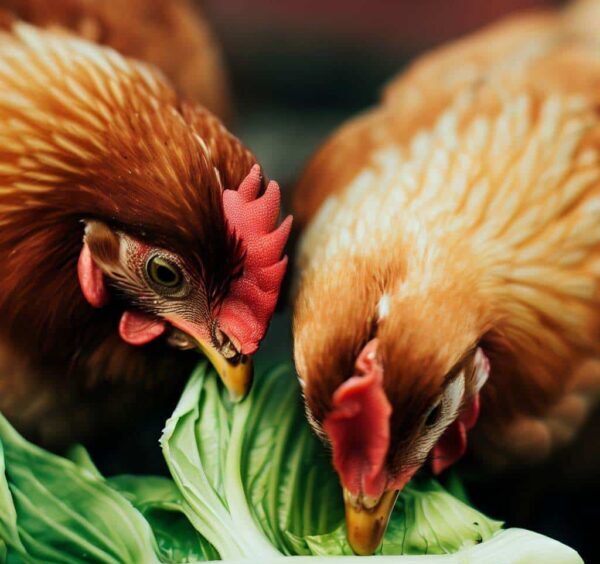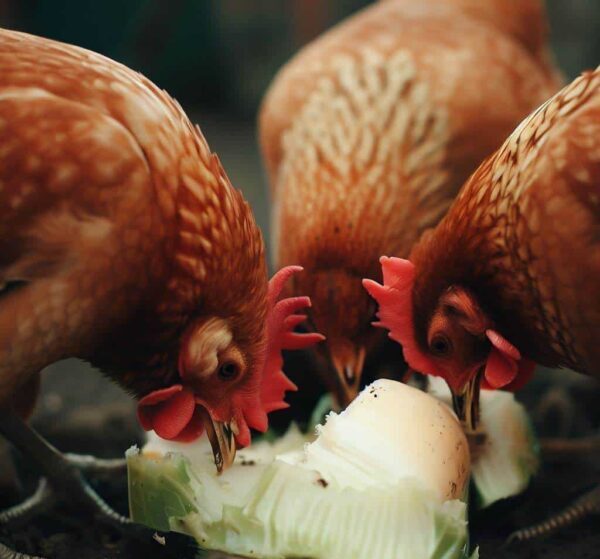Can Chickens Eat Apples? (What You Need To Know)
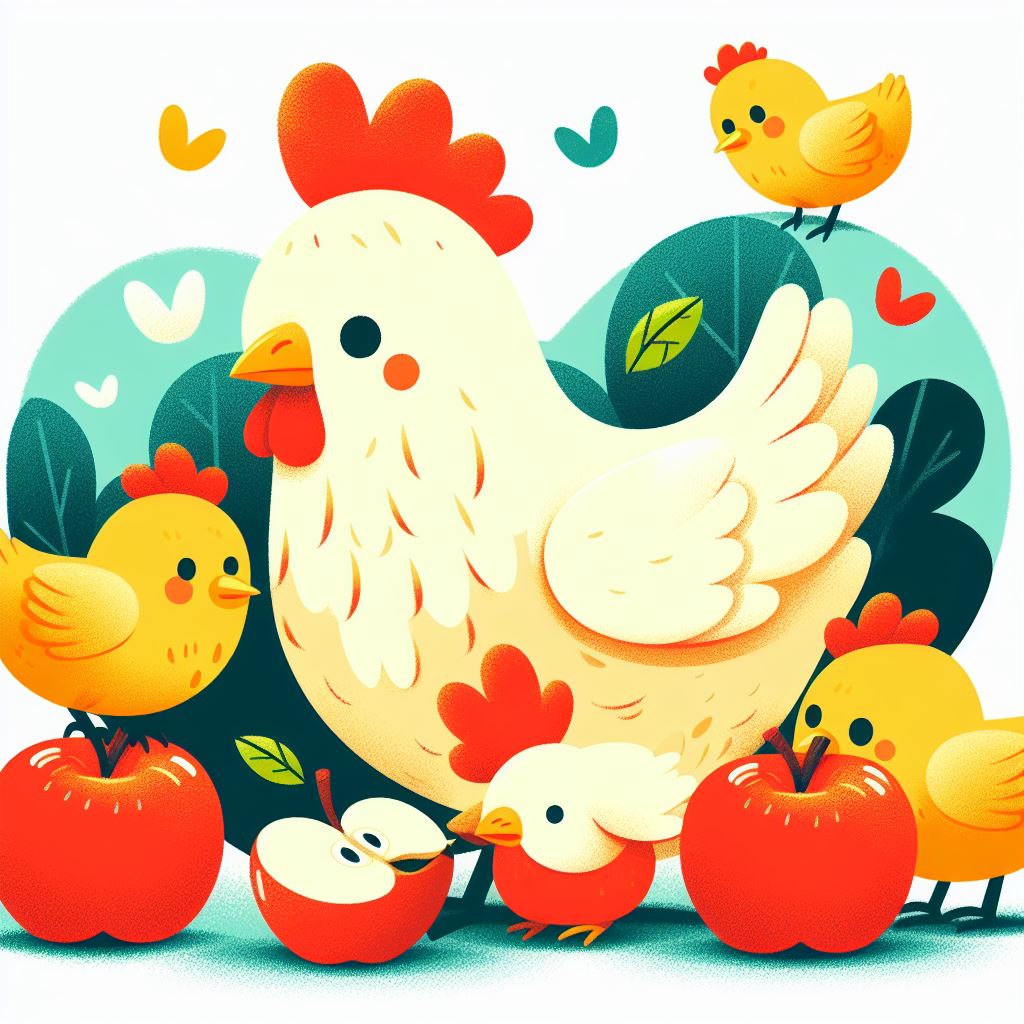
Yes, Chickens can eat apples as it contains nutrients that helps to develop a better digestive, immune system, feather quality for chickens.
Give apples to your chickens in moderation as too much of it can also cause some negative impacts.
Feeding chickens apples can be both beneficial and risky. These fruity delights provide essential nutrients but come with potential hazards. Understanding the dos and don’ts is crucial to keeping your flock healthy and happy.
Let’s dive into the ins and outs of feeding apples to chickens – from nutritional benefits to potential pitfalls.
Topics Covered In This Article
- Feeding Chickens Apples (Short Version)
- Nutritional Profile of Apples
- Preparing Apples for Chickens
- Recommended Apple Portions
- Health Benefits for Chickens
- Potential Hazards of Apple Seeds
- Diversifying Chicken Diets
- Creative Apple Treats
- Moderation in Feeding Apples
- Foods That Can Be Toxic To Chickens
- Summary
- Frequently Asked Questions
Feeding Chickens Apples (Short Version)
Apple Benefits
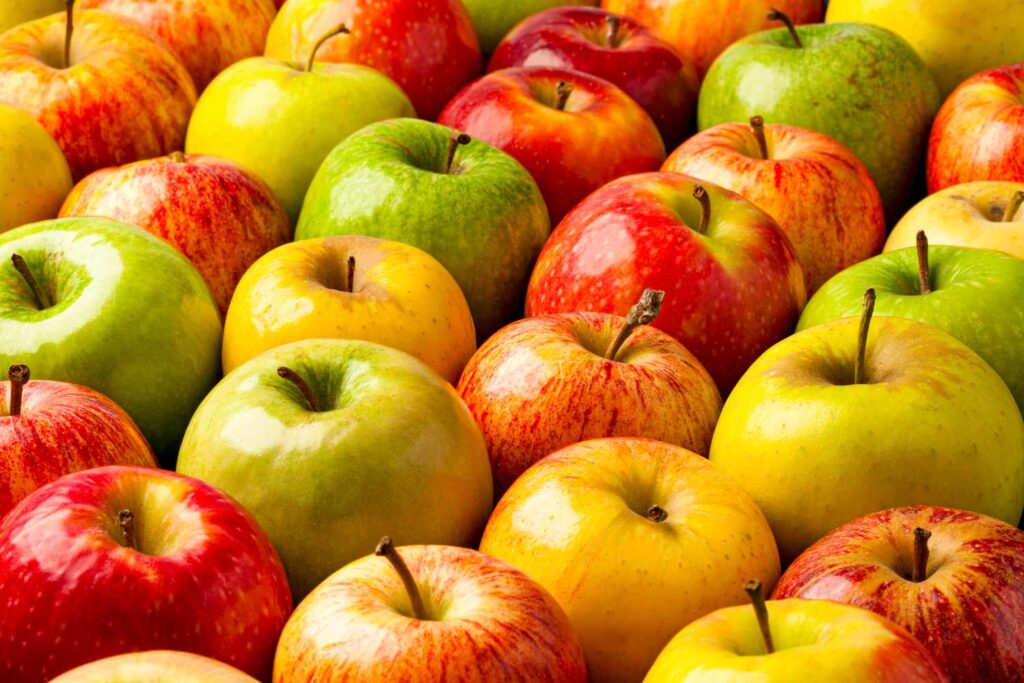
Chickens can indeed eat apples. They are a safe and healthy treat for your flock, providing essential vitamins and minerals. Moderation is key when feeding apples to chickens. The fibre content in apples aids in digestion, making them a great supplement to a chicken’s regular feed.
Apples are packed with nutrients beneficial for chickens’ overall health. They contain vitamins such as A, C, and K, along with essential minerals like calcium and phosphorus. These nutrients contribute to the development of strong bones and feathers in chickens.
Feeding apples in moderation ensures that your chickens receive the benefits without overindulging on sugary treats. Too many apples can lead to an imbalance in their diet or cause digestive issues due to excessive sugar intake.
Safety Concerns
When considering what treats to offer your flock, it’s important to prioritize their nutritional needs while also providing variety and enrichment through occasional treats like apples. The fibre found in apples supports digestive health by aiding in the breakdown of other foods they consume.
In addition to promoting good digestion, the vitamins present in apples help boost overall immunity among chickens by supporting their natural defences against common illnesses.
To ensure optimal health for large breed chickens specifically bred for rapid growth, it’s crucial to monitor their food intake closely while incorporating a balanced diet that includes protein-rich feed alongside occasional fruits like apples.
Nutritional Profile of Apples
According to Food Data Central, A 100-gram portion of raw apple with skin contains
| Nutrient | Amount |
|---|---|
| Water | 85.6 g |
| Energy | 52 kcal |
| Protein | 0.26 g |
| Fat | 0.17 g |
| Ash | 0.19 g |
| Carbohydrates | 13.8 g |
| Fibers | 2.4 g |
| Total Sugars | 10.4 g |
| Calcium | 6 mg |
| Iron | 0.12 mg |
| Magnesium | 5 mg |
| Phosphorus | 11 mg |
| Potassium | 107 mg |
| Sodium | 1 mg |
| Zinc | 0.04 mg |
| Copper | 0.027 mg |
| Manganese | 0.035 mg |
| Fluoride | 3.3 µg |
| Vitamin C | 4.6 mg |
Vitamins and Minerals
Apples contain vitamin C, A, and K which contribute significantly to the well-being of chickens.
However, it’s crucial to remove the apple seeds before feeding them to chickens as they contain compounds that can lead to potential cyanide poisoning. Moreover, be cautious of pesticide residues on apple skins; washing or peeling the apples can help mitigate this risk. After introducing apples into your chickens’ diet, monitor them for any allergic reactions.
Fibre Content
The fibre in apples not only supports healthy digestion but also provides an array of vital nutrients for chickens. The minerals present in apples such as potassium and magnesium offer a well-rounded diet for chickens. Including apples in their diet can help prevent vitamin deficiencies and promote overall health.
Hydration Source
Incorporating apples into chickens’ diet aids in regulating their digestive system due to the high fibre content present in these fruits. The fibre from apples contributes to maintaining good gut health by facilitating smooth digestion processes within chickens’ bodies.
Preparing Apples for Chickens
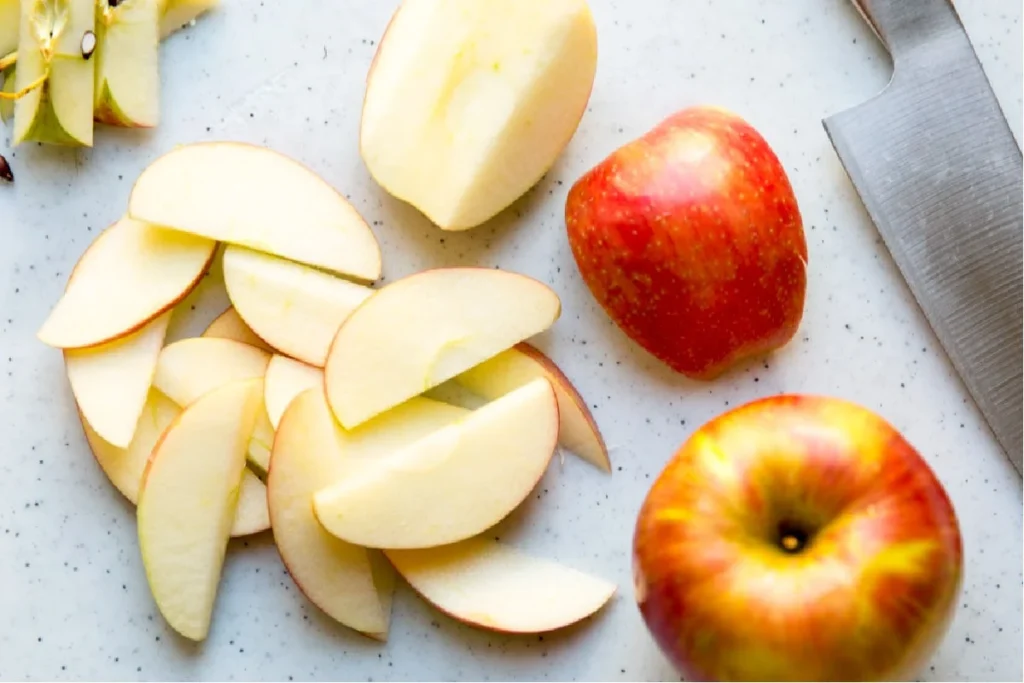
Washing and Cutting
Apples are a great source of hydration for chickens as they contain high water content. Giving apples to chickens can be an alternative way to ensure they stay hydrated, especially during hot weather. By including apples in their diet, you can supplement their daily water intake and help them stay healthy.
To prepare apples for chickens, it’s crucial to wash them thoroughly before feeding. This helps remove any potential contaminants such as pesticides or dirt that may harm the chickens. Once washed, cutting the apples into small pieces is essential to make it easier for the chickens to consume. Small, manageable pieces prevent choking hazards and ensure that the birds can enjoy their treat safely.
Removing Seeds
When preparing apples for chickens, it’s important to be mindful of certain parts that pose risks if ingested. Apple seeds contain cyanide which is toxic to chickens if consumed in large quantities. As a result, removing all seeds from the apple is crucial before offering it as a treat.
Properly removing seeds from the apple prevents any chance of poisoning in your flock. It’s best practice not only to avoid giving them apple cores but also ensuring there are no loose seeds left behind when cutting up the fruit.
Recommended Apple Portions
Adult Chickens
Introduce new foods like apples gradually into a chicken’s diet. Start with small portions to observe their reaction. Monitor chicken behaviour after introducing apples to ensure they are well-tolerated. Watch for any signs of digestive issues or allergies.
Following safe practices when feeding treats like apples promotes chicken health. Ensure the apples are fresh and free from mould or rot. Remove any seeds as they contain cyanide, which is harmful to chickens.
Feeding adult chickens apples can be a rewarding and nutritious addition to their diet. Apples provide essential nutrients such as vitamins A and C, as well as dietary fibre, which supports overall chicken health.
Baby Chicks
It’s crucial to consider age limitations before incorporating new foods like apples into their diet. Young chicks have delicate digestive systems that may not tolerate certain foods well.
Wait until the baby chicks have matured into adult chickens before introducing them to apple slices or pieces in moderation.
Health Benefits for Chickens
Digestive Health
It’s important to consider their digestive health. Adjust the size of apple pieces based on the age of the chickens. Younger chicks may need smaller apple pieces compared to adult birds. This ensures safe consumption for all chickens, preventing any choking hazards.
Considering age when feeding apples is crucial as it helps in ensuring that chickens can safely enjoy this nutritious treat without any complications. For instance, younger chicks have developing digestive systems, so smaller apple pieces are easier for them to digest.
Immune Boosting
Chickens can benefit from consuming apples due to their immune-boosting properties. The fibre content in apples supports optimal digestive health for chickens, aiding in preventing potential digestive issues. By including apples in their diet, chicken owners can contribute to maintaining good digestive health which is essential for the overall well-being of these birds.
Feeding chickens with small portions of fresh or dried apple slices provides an easy way to introduce a variety of nutrients into their diet while offering a natural immune system boost through regular consumption.
Feather Quality
In addition to supporting digestion and boosting immunity, feeding apples can also positively impact feather quality in chickens. Apples contain nutrients that contribute to boosting the immune system of these birds while helping support their natural defences against illnesses.
Potential Hazards of Apple Seeds
Cyanide Concerns
Apples are a nutritious treat for chickens, providing essential vitamins and minerals that contribute to improved feather quality. However, it’s crucial to be mindful of the potential hazards associated with apple seeds. These seeds contain amygdalin, a compound that can release cyanide when metabolised.
Consuming large quantities of apple seeds could lead to cyanide poisoning in chickens. While the risk is relatively low due to the hard seed coating that needs to be broken down for cyanide release, it’s still important for chicken owners to monitor their flock’s apple seed consumption.
Seed Removal
To mitigate the risk of cyanide exposure, it’s advisable for chicken owners to remove apple seeds before feeding these fruits to their flock. By doing so, they can ensure that their chickens enjoy the nutritional benefits of apples without being exposed to potential harm from consuming the seeds.
Monitoring apple seed consumption directly reduces the likelihood of accidental poisoning. This simple practice can safeguard chickens from any adverse effects associated with ingesting apple seeds.
Diversifying Chicken Diets
It’s essential to ensure that the fruit is safe for consumption. Properly removing apple seeds before feeding prevents potential toxicity risks. The seeds of an apple contain cyanide, which can be harmful to chickens if ingested in large quantities.
Taking care to eliminate all seeds from apple slices ensures safe consumption by chickens. Even though the flesh of the apple is safe, the core and seeds should be removed before offering it as a treat.
Thoroughly checking and removing seeds from all apple pieces reduces hazards for chickens. By doing so, chicken owners can provide their flock with a nutritious and enjoyable snack without any risk of poisoning.
In addition to apples, other safe fruits for chickens include berries, melons, and pears. Offering a variety of fruits ensures diverse nutrient intake for backyard poultry.
Incorporating different fruits into a chicken’s diet provides nutritional benefits such as vitamins A and C, potassium, fibre and antioxidants that contribute towards overall health maintenance.
Safe vegetable options for chickens include leafy greens like spinach or kale, carrots, squash etc. Including vegetables alongside fruits creates a balanced diet regimen with adequate nutrients including proteins (from insects), carbohydrates (from grains) fats (from sunflower seed), minerals & vitamins(from vegetables).
Vegetables offer additional vitamins and minerals that complement fruit consumption ensuring better nutrition value in their daily feedings.
Creative Apple Treats
Baked Stuffed Apples
They make a delicious and nutritious treat option for backyard poultry. Local apples are plentiful, making them an easily accessible and affordable choice for creating delightful treats for chickens. The skins and flesh of the apples are not only tasty but also offer essential nutrients, providing a healthy snack alternative for our feathered friends.
Stuffed apple treats can be further enhanced by incorporating protein-rich ingredients like oats or mealworms into the stuffing mixture. This addition not only introduces variety in texture but also boosts the nutritional value of the treat, offering chickens a more balanced snack option. Moreover, baking stuffed apples provides an enjoyable way to present this fruit as a treat while retaining its natural goodness.
It’s worth noting that whole apples can also be served by washing and coring them before hanging them up for chickens to enjoy slowly. This method not only offers entertainment but also encourages natural pecking behavior among the birds.
Easy Snack Ideas
In addition to baked stuffed apples, there are other creative ways to serve apples as snacks for chickens. For instance, diced apples can be combined with zucchini and popcorn to create enticing garlands that provide both visual stimulation and edible enjoyment for poultry.
Another fun idea involves preparing stuffed apple treats using peanut butter and sunflower seeds – a combination that promises delight while adding valuable nutrients to the chicken’s diet.
Moderation in Feeding Apples
Balance and Variety
Offering chopped fruits like bananas or grapes alongside apple slices provides backyard poultry with a balanced and varied diet. Including mealworms or crickets with fruit snacks adds protein variety, ensuring the birds receive diverse nutrients. This approach not only enriches their diet but also supports their overall well-being.
Pet or farm-raised birds benefit from easy snacks, such as apples, as they provide both enrichment and nutrition. By incorporating a mix of fruits and protein sources into their diet, owners can ensure that their feathered friends enjoy a healthy and diverse range of nutrients.
Overfeeding Risks
While treats like apples can be beneficial for chickens, it’s crucial to maintain moderation. Balancing these treats with regular feed is essential to prevent overfeeding. Providing a variety of treats alongside staple feed offers chickens a more diverse nutrient intake, contributing to optimal nutrition.
Promoting balance and variety in the diet helps ensure the well-being of pet or farm-raised birds. It allows them to obtain essential nutrients from various sources while preventing overconsumption of any particular food item.
Foods That Can Be Toxic To Chickens
Knowing which foods are harmful is crucial in ensuring the well-being of chickens. It’s important to avoid feeding toxic items such as chocolate, avocado, or onions to prevent accidental poisoning in backyard poultry. By being aware of these harmful foods, chicken owners can effectively safeguard their flocks from potential health risks.
Summary
You’ve learned all about feeding chickens apples. From their nutritional benefits to potential hazards, you now have a good understanding of how to incorporate this fruit into your chickens’ diet.
Remember, moderation is key, and always remove the seeds before offering apples to your feathered friends. Diversifying their diet with healthy treats like apples can contribute to their overall well-being.
Now it’s time to head out to the coop and share your newfound knowledge with your clucking companions. Get creative with some apple treats, but don’t forget to keep it in moderation. Your chickens will thank you for the tasty and nutritious additions to their diet!
Frequently Asked Questions
Yes, chickens can eat apples. Apples are a nutritious treat for chickens and provide essential vitamins and minerals.
Wash the apples thoroughly to remove any pesticides or dirt. Then, cut them into small, manageable pieces to prevent choking hazards.
Apples provide a good source of vitamin C, fibre, and antioxidants that support overall chicken health and immune function.
Yes, apple seeds contain cyanide compounds which can be harmful if consumed in large quantities. It’s best to remove the seeds before offering apples to your flock.
Offer apples as an occasional treat rather than a regular part of their diet. Moderation is key to maintaining a balanced chicken diet.
Last Updated on 16 March 2024
Waman Nuka is a seasoned wordsmith and a passionate animal enthusiast with decades of experience in the world of animal care. With a deep love for all creatures great and small, Waman’s journey in the realm of animals started as a young boy exploring the lush forests surrounding his childhood home.

